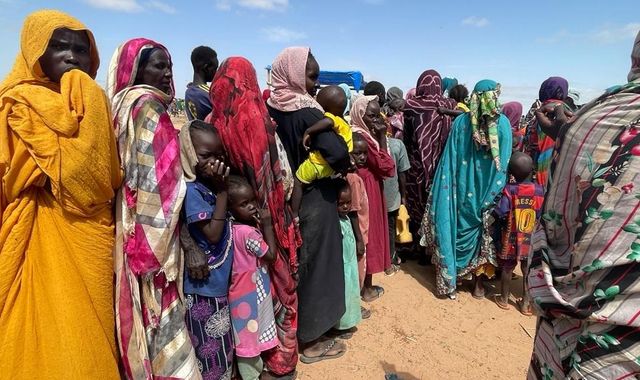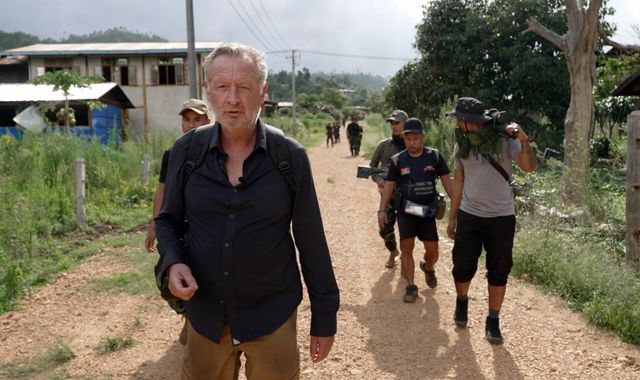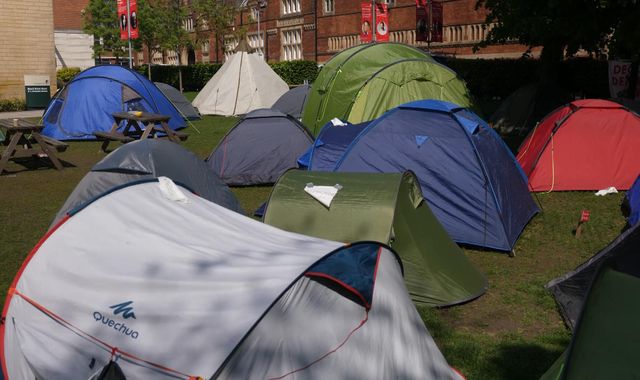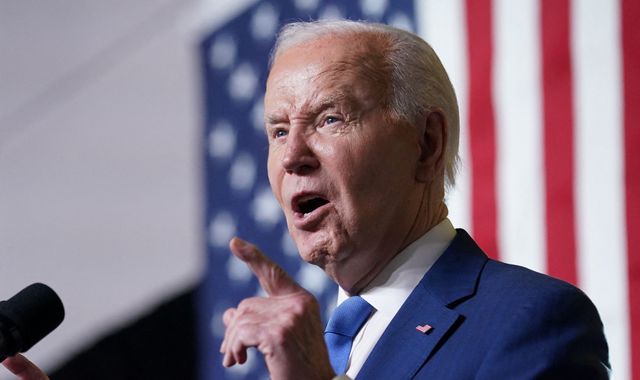Sudan: Civilians trapped as UN warns of possible imminent attack on city of al Fashir by Rapid Support Forces
27 April 2024, 15:12 | Updated: 27 April 2024, 18:12

The United Nations has expressed increasing concern over a potential imminent attack on al Fashir, the capital of North Darfur in Sudan.
It comes as residents describe the city as "seriously suffocated" and besieged by Sudanese paramilitary forces known as the Rapid Support Forces (RSF).
A spokesperson for the office of UN secretary general Antonio Guterres said in a statement that "an attack on the city would have devastating consequences for the civilian population".
"The escalation of tensions is an area already on the brink of famine," with the rival Sudanese Armed Forces (SAF) appearing to be "positioning themselves".
The last of Darfur's five state capitals not under full RSF control, al Fashir city and its 800,000 inhabitants face an uncertain fate as a local ceasefire negotiated in the early days of the conflict has collapsed.
Mr Guterres has reiterated his call on all parties to refrain from fighting in the area.
At least 43 people, including women and children, have reportedly been killed since the RSF began their push into al Fashir earlier this month, Friday's UN statement continued, and civilians are trapped in the city.
The North Darfur capital and sprawling displacement camps in its suburbs have been a haven for thousands of people displaced by armed conflict and ethnic violence in the region since the early 2000s, including the last year of war between the RSF and SAF.
Sudan was plunged into chaos in mid-April 2023 when tensions between its military, headed by General Abdel Fattah Burhan who leads the SAF, and the RSF paramilitary, commanded by Mohammed Hamdan Dagalo, broke out into street battles in the capital Khartoum.
Fighting has spread to other parts of the country, especially urban areas and the western Darfur region.
The conflict has left around 25 million people, or half the country's population, needing humanitarian aid, with over eight million forced to flee their homes, said the UN.
More than 14,000 people have been killed and tens of thousands of others wounded.
Residents have told Sky News the RSF is blocking main arterial routes bringing in goods and fuel to al Fashir, leaving them with dwindling medicine, humanitarian aid and food supplies as increased army airstrikes have hit civilian homes in surrounding areas.
Many fear a telecoms blackout which marked the start of an RSF-led massacre last year in al Geneina, the capital of West Darfur, and December's siege of Wad Madani, the capital of al Jazira state, as reports mount of an RSF advance.
Read more:
Sudan could be weeks away from a 'catastrophic hunger crisis'
The orphaned and disabled children forced to flee fighting in Sudan
An online video shows a large RSF convoy in the desert, with militiamen yelling "lift your head al Fashir, the steel is coming".
"Al Fashir is unsafe and an attack is expected at any time. Three days ago, a shell fell into my uncle's house - only 80 metres from my home. My uncle was injured and my cousin's son died," said Mohamed.
"The city is seriously suffocated."
Fighting displaced 40,615 people in al Fashir between 1 and 16 April, according to the International Organisation for Migration (IOM).
'Where will people go?'
Aid organisation Medecins Sans Frontieres (MSF), also known as Doctors Without Borders, has said it has responded to three mass casualty events in al Fashir's South Hospital over the past week and treated over 100 wounded patients.
"The situation is already catastrophic and we are very worried that the escalation in conflict is going to make it even worse," said MSF spokesperson Kirsty Cameron.
Alarm bells are sounding with little hope of successful intervention.
"Where will people go? People have fled to al Fashir from surrounding areas that are still unsafe. There are no more options for refuge," said Darfuri journalist and human rights monitor Ahmed Gouja.
"They are forced to surrender to their death."
(c) Sky News 2024: Sudan: Civilians trapped as UN warns of possible imminent attack on city of al Fashir by Rapid Support Forces


























